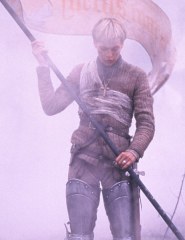 Starring
Milla Jovovich, John Malkovich, Faye Dunaway, Dustin Hoffman, Pascal Greggory,
Vincent Cassel, Tchéky Karyo, Richard Ridings, Desmond Harrington, Timothy
West.
Starring
Milla Jovovich, John Malkovich, Faye Dunaway, Dustin Hoffman, Pascal Greggory,
Vincent Cassel, Tchéky Karyo, Richard Ridings, Desmond Harrington, Timothy
West. Written by Luc Besson and Andrew Birkin.
Directed by Luc Besson.
 Starring
Milla Jovovich, John Malkovich, Faye Dunaway, Dustin Hoffman, Pascal Greggory,
Vincent Cassel, Tchéky Karyo, Richard Ridings, Desmond Harrington, Timothy
West.
Starring
Milla Jovovich, John Malkovich, Faye Dunaway, Dustin Hoffman, Pascal Greggory,
Vincent Cassel, Tchéky Karyo, Richard Ridings, Desmond Harrington, Timothy
West.
Written by Luc Besson and Andrew Birkin.
Directed by Luc Besson.
Grade: D
Review by Jeff Vorndam.
"....a haunting, riveting portrait of the historical martyr based on documentation from the original trial."The above quotes refer to Carl Dreyer’s classic The Passion of Joan of Arc. One of cinema’s foremost masterpieces, the film compellingly tells the tale of a young girl from Orléans who leads the French to victory over the English, and is then betrayed by her King and martyred by the English for heresy. Told exclusively in medium and close-up shots, the story rivets us to Joan’s face, a map of powerful expression unlike any other. The tale of Joan of Arc has also been directed by Victor Fleming (with Ingrid Bergman as Joan), Otto Preminger, Robert Bresson, and Jacques Rivette. On November 12, we are treated with Luc (The Fifth Element) Besson’s version.--Gregory Bruce Carlson, Fargo, ND"....It may be the finest performance ever recorded on film."--Pauline Kael

What does Besson bring to the table that none of the other directors have tried? What’s his spin? On one level, he wants rip-roaring entertainment like Braveheart, on another, a modern feminist commentary like Elizabeth, and on yet another, a grave examination of faith, belief, and reality like (pick a Bergman film). Thrown all together in the least subtle way possible, The Messenger emerges as a catastrophe of epic proportions. The film switches gears from bloody battle scenes to lame-ass wisecracks (I half expected to hear the infamous, “I’m too old for this shit!” line) before going into Serious Dramatic Overdrive. Helping us along the way are big name actors whose mere presence should make us notice them, but they are hardly given anything to do–except overact. The less famous supporting contingent serve to muddle things with a bewildering array of accents, some sounding French and others vaguely like San Fernando Valley. One would hope the naturally thrilling real-life account of Joan of Arc would be enough to gloss over these annoyances.
Unfortunately, despite the 140 minute running length (and I counted them, every
minute is there), the story is scant. Milla Jovovich, who was presumably cast
as Joan because she physically resembles a 9 year old boy (oh, and being the
main squeeze of the director at the time doesn’t hurt either), enters the movie
about twenty-five minutes along. The prologue had already lowered my expectations
with its graphic and brutal rape scene, gleefully crossing the line into necrophilia.
If you were offended by the rape scene in Rob Roy, I suggest showing
up late to this film, if it all. The act itself isn’t what’s offensive, but
the cavalier handling of it is. As the rapist is having his way (and he’s a
typical 15th century rapist, he only has three or four teeth), Besson intercuts
to two of his comrades who are busy snarfing down some gruel (mmmm…gruel!).
They exchange increasingly queasy glances at the rapist’s actions, and when
the rapist is finished and offers the dead woman up to them to continue defiling
they do a double-take that’s played for comic effect. Lovely. 
Throughout these early scenes the general mood and look of the film is established: bombast. No music cue cuts in softly when thunderously will do. No visual element is complete without some hyperactivity (i.e., clouds rolling by really fast). I suppose you could argue that we are being presented with subjective viewpoint of a precarious young girl, but these devices are too cliched to be effective.
Jovavich plays Joan as a wild-eyed looney, always at the end of her tether.
Her vocalizations consist of either tremulous whispers or voice-cracking banshee
screams. It is amazing that any army would ever follow her. The French military
leaders are initially skeptical. She claims to a messenger from God (Warning!
Loony!), and she’s a teenage girl. Through sheer force of conviction she somehow
manages to convince them to follow her into battle. They must have been desperate.
Joan only makes to the battlefield thanks to some behind-the-scenes finagling
by the would-be King’s stepmother, played archly by Faye Dunaway. We know the
stepmother has nefarious intentions though, because 1) she is a stepmom;
2) she’s clad in an all-black ensemble that evokes a black widow, and 3) the
score helpfully rumbles ominously. All that’s missing are lightning flashes
and thunder cracks.  The
stepmother convinces the would-be King (John Malkovich) to assign Joan to the
battlefield by suggesting that maybe the girl really is a messenger from God
and if so she can take Paris. With Paris back under French control, the would-be
King could become the official King. After that, they’ll find some way to get
rid of this fanatic girl warrior. As the King of France, John Malkovich transcends
foppishness in an impression of Corky St. Clair from Waiting for Guffman.
He can’t be taken seriously, and his scenes achieve camp status that is atonal
from the aspirations of the rest of the film.
The
stepmother convinces the would-be King (John Malkovich) to assign Joan to the
battlefield by suggesting that maybe the girl really is a messenger from God
and if so she can take Paris. With Paris back under French control, the would-be
King could become the official King. After that, they’ll find some way to get
rid of this fanatic girl warrior. As the King of France, John Malkovich transcends
foppishness in an impression of Corky St. Clair from Waiting for Guffman.
He can’t be taken seriously, and his scenes achieve camp status that is atonal
from the aspirations of the rest of the film.
As those familiar with the story of Joan of Arc know, she is initially successful
in defeating the English. Despite the enemies’ taunts (they sound remarkably
similar to the French knights in Monty Python and The Holy Grail), her
army routs the opposition, sundering heads from torsos and drenching themselves
in blood in the process. Her attack on Paris is a failure though, as the King
has withdrawn support from her after his coronation. Joan ends up captured by
the English and tried for heresy.  Here
the film becomes resolutely serious, as it seeks to question Joan’s faith in
God and the validity of her claims to being a messenger. The device Besson uses
is that of a personification of her conscience, played by Dustin Hoffman. In
tight close-ups with a digitally lowered voice, Hoffman hams the Grand Inquisitor
role, suggesting that Joan’s “voices” were constructs of her own imagination
and that her entire campaign is based on bloodlust for her sister’s rape at
the beginning of the film. (The Grand Inquisitor doesn’t seem to remember that
Joan talked to voices before the rape.) When Joan is not be harangued by her
conscience, she is being cross-examined by Church and State officials on grounds
of heresy. In a series of familiar fishbowl-lensed scenes, Joan is badgered
for repentance, while all she asks is to have her confession heard. It is symptom
of how little I was enjoying the movie that I couldn’t wait for the interrogations
to be over so they could just burn the girl.
Here
the film becomes resolutely serious, as it seeks to question Joan’s faith in
God and the validity of her claims to being a messenger. The device Besson uses
is that of a personification of her conscience, played by Dustin Hoffman. In
tight close-ups with a digitally lowered voice, Hoffman hams the Grand Inquisitor
role, suggesting that Joan’s “voices” were constructs of her own imagination
and that her entire campaign is based on bloodlust for her sister’s rape at
the beginning of the film. (The Grand Inquisitor doesn’t seem to remember that
Joan talked to voices before the rape.) When Joan is not be harangued by her
conscience, she is being cross-examined by Church and State officials on grounds
of heresy. In a series of familiar fishbowl-lensed scenes, Joan is badgered
for repentance, while all she asks is to have her confession heard. It is symptom
of how little I was enjoying the movie that I couldn’t wait for the interrogations
to be over so they could just burn the girl.
So, if you enjoy overblown period-piece spectacles with no consistency of tone or theme, rush thee out to see The Messenger: The Story of Joan of Arc. If you do not, then I, at least, forgive you and absolve you of all responsibility for seeing this film.
Note: Jeff later changed his rating for this film from a D to a D-.
Review © November 1999 by AboutFilm.Com
and the author.
Images © Gaumont 1999.
|
Read user comments on this
review or send us a comment. |
 |